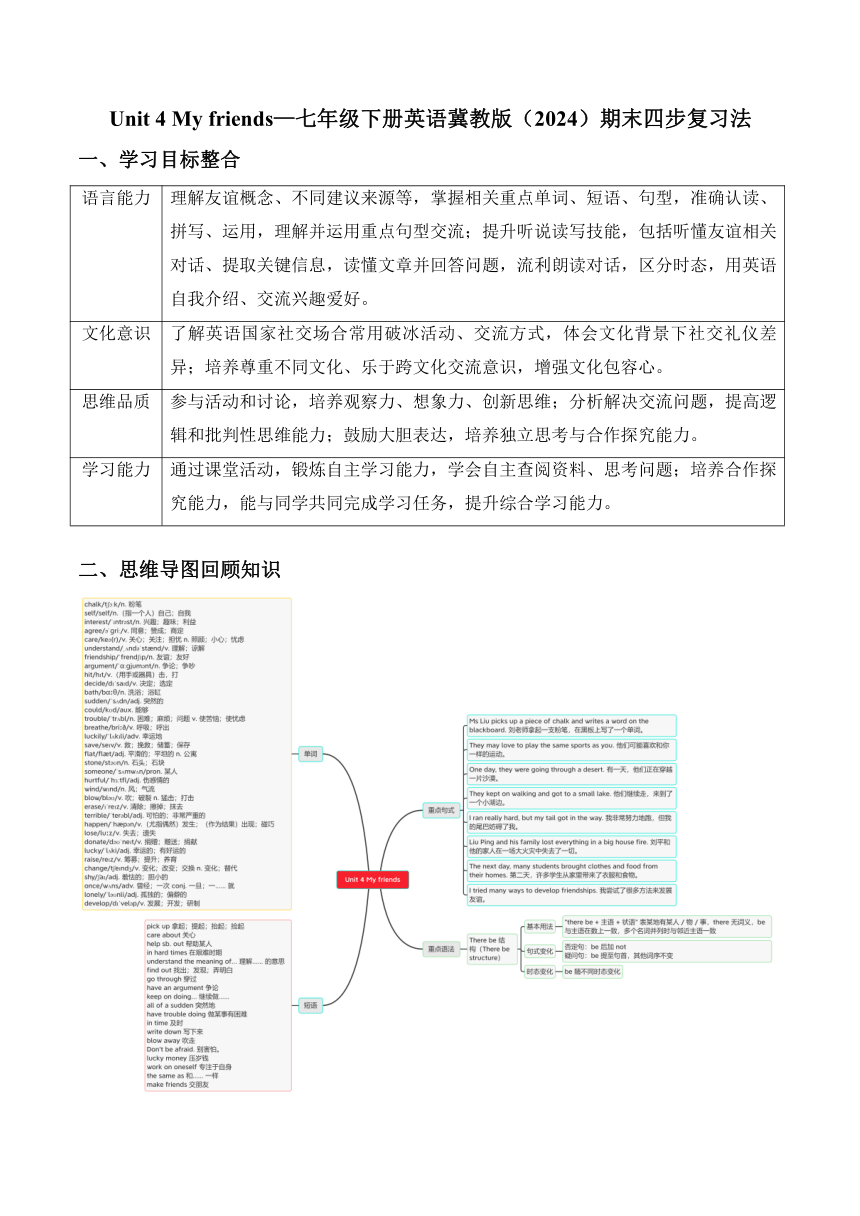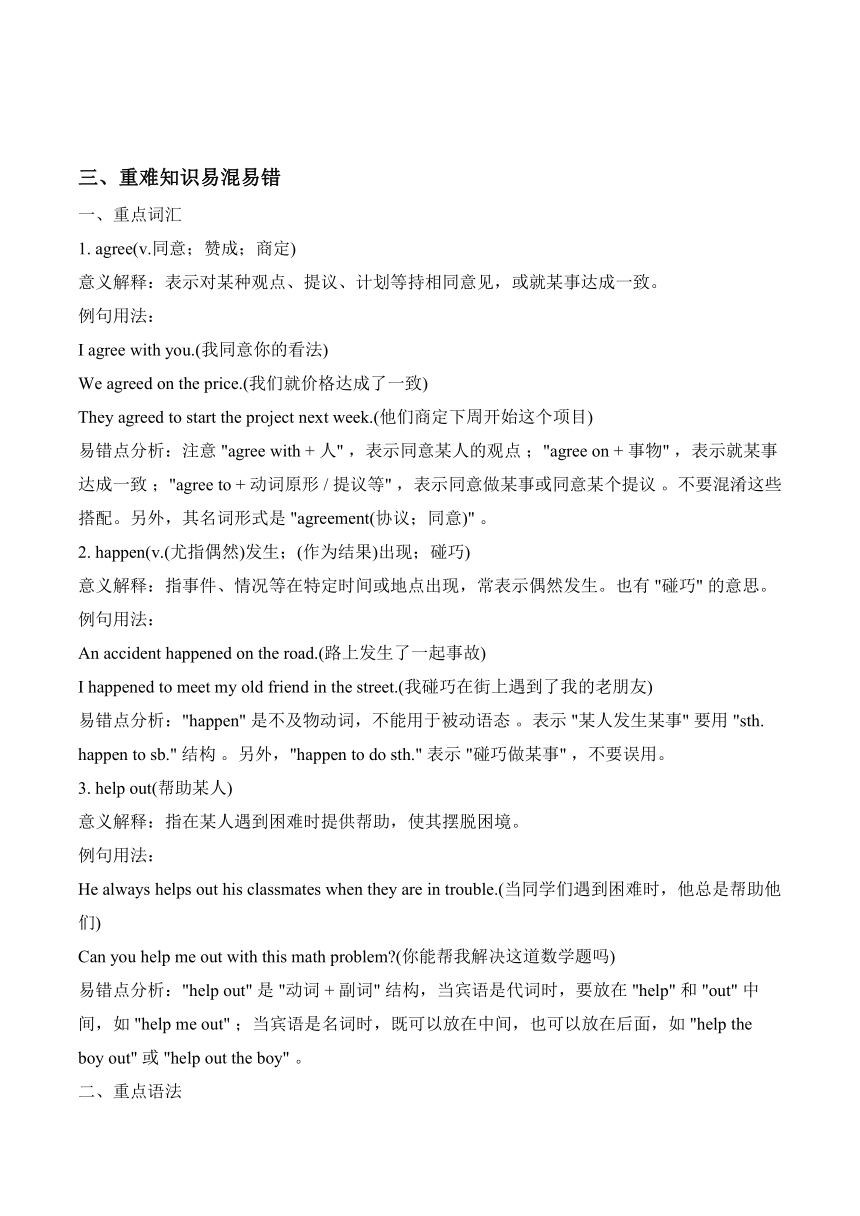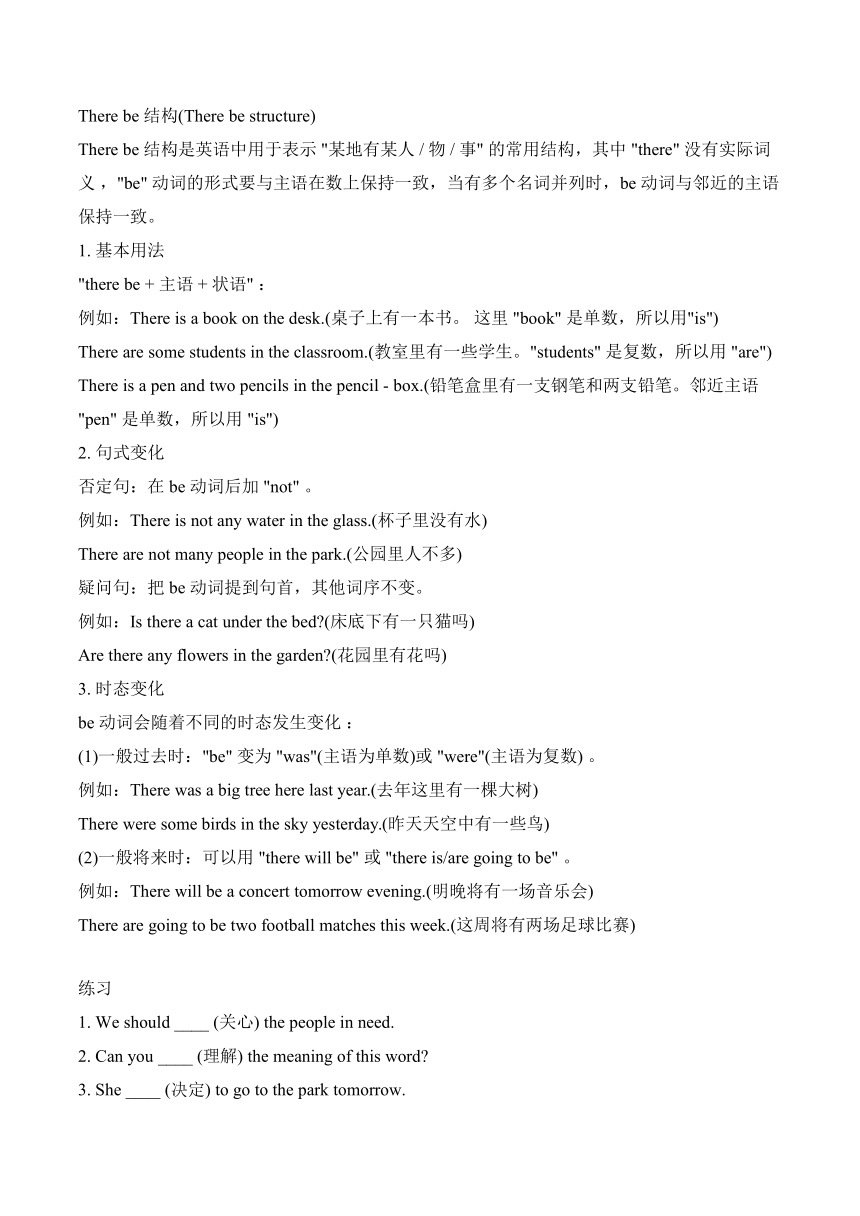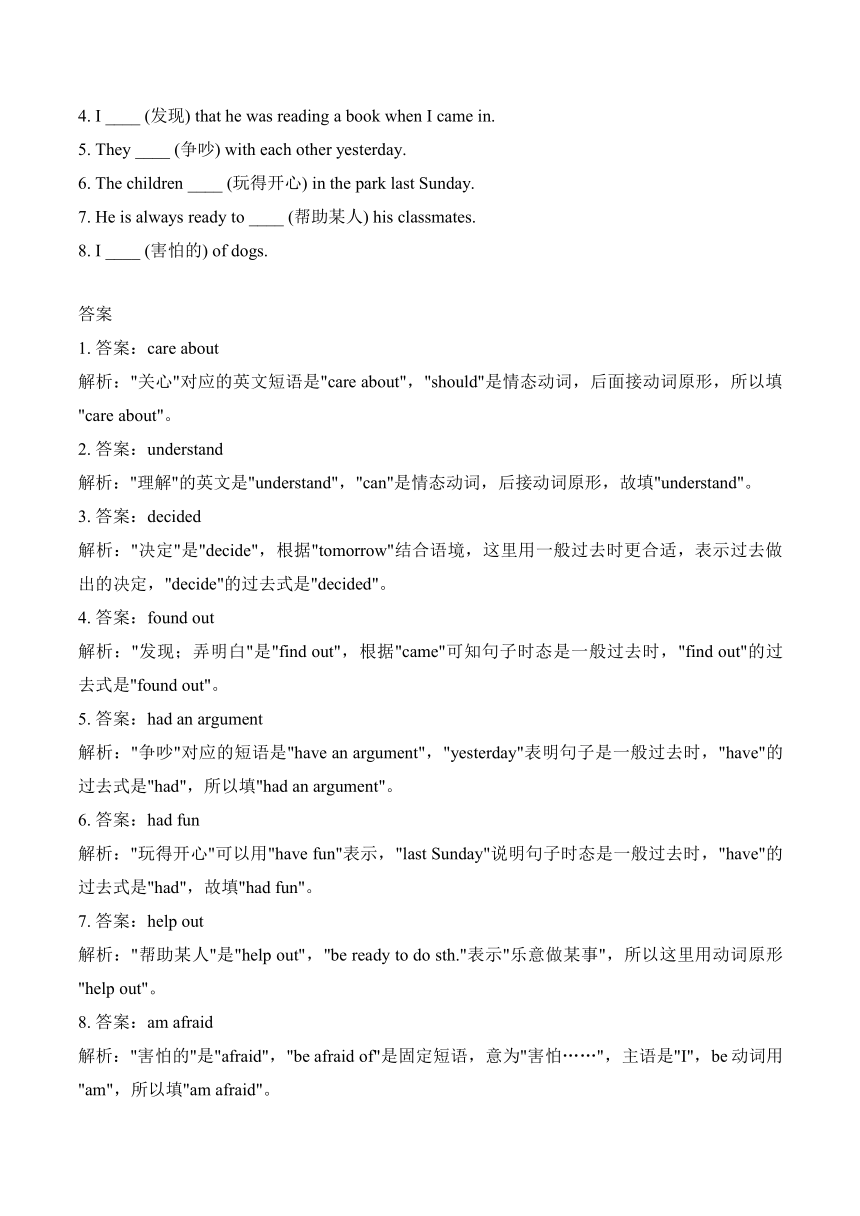Unit 4 My friends 冀教版(2024)七年级下册期末四步复习法(含答案)
文档属性
| 名称 | Unit 4 My friends 冀教版(2024)七年级下册期末四步复习法(含答案) |  | |
| 格式 | docx | ||
| 文件大小 | 5.8MB | ||
| 资源类型 | 教案 | ||
| 版本资源 | 冀教版 | ||
| 科目 | 英语 | ||
| 更新时间 | 2025-05-29 09:53:04 | ||
图片预览




文档简介
Unit 4 My friends—七年级下册英语冀教版(2024)期末四步复习法
一、学习目标整合
语言能力 理解友谊概念、不同建议来源等,掌握相关重点单词、短语、句型,准确认读、拼写、运用,理解并运用重点句型交流;提升听说读写技能,包括听懂友谊相关对话、提取关键信息,读懂文章并回答问题,流利朗读对话,区分时态,用英语自我介绍、交流兴趣爱好。
文化意识 了解英语国家社交场合常用破冰活动、交流方式,体会文化背景下社交礼仪差异;培养尊重不同文化、乐于跨文化交流意识,增强文化包容心。
思维品质 参与活动和讨论,培养观察力、想象力、创新思维;分析解决交流问题,提高逻辑和批判性思维能力;鼓励大胆表达,培养独立思考与合作探究能力。
学习能力 通过课堂活动,锻炼自主学习能力,学会自主查阅资料、思考问题;培养合作探究能力,能与同学共同完成学习任务,提升综合学习能力。
二、思维导图回顾知识
三、重难知识易混易错
一、重点词汇
1. agree(v.同意;赞成;商定)
意义解释:表示对某种观点、提议、计划等持相同意见,或就某事达成一致。
例句用法:
I agree with you.(我同意你的看法)
We agreed on the price.(我们就价格达成了一致)
They agreed to start the project next week.(他们商定下周开始这个项目)
易错点分析:注意 "agree with + 人" ,表示同意某人的观点 ;"agree on + 事物" ,表示就某事达成一致 ;"agree to + 动词原形 / 提议等" ,表示同意做某事或同意某个提议 。不要混淆这些搭配。另外,其名词形式是 "agreement(协议;同意)" 。
2. happen(v.(尤指偶然)发生;(作为结果)出现;碰巧)
意义解释:指事件、情况等在特定时间或地点出现,常表示偶然发生。也有 "碰巧" 的意思。
例句用法:
An accident happened on the road.(路上发生了一起事故)
I happened to meet my old friend in the street.(我碰巧在街上遇到了我的老朋友)
易错点分析:"happen" 是不及物动词,不能用于被动语态 。表示 "某人发生某事" 要用 "sth. happen to sb." 结构 。另外,"happen to do sth." 表示 "碰巧做某事" ,不要误用。
3. help out(帮助某人)
意义解释:指在某人遇到困难时提供帮助,使其摆脱困境。
例句用法:
He always helps out his classmates when they are in trouble.(当同学们遇到困难时,他总是帮助他们)
Can you help me out with this math problem (你能帮我解决这道数学题吗)
易错点分析:"help out" 是 "动词 + 副词" 结构,当宾语是代词时,要放在 "help" 和 "out" 中间,如 "help me out" ;当宾语是名词时,既可以放在中间,也可以放在后面,如 "help the boy out" 或 "help out the boy" 。
二、重点语法
There be 结构(There be structure)
There be 结构是英语中用于表示 "某地有某人 / 物 / 事" 的常用结构,其中 "there" 没有实际词义 ,"be" 动词的形式要与主语在数上保持一致,当有多个名词并列时,be 动词与邻近的主语保持一致。
1. 基本用法
"there be + 主语 + 状语" :
例如:There is a book on the desk.(桌子上有一本书。 这里 "book" 是单数,所以用"is")
There are some students in the classroom.(教室里有一些学生。"students" 是复数,所以用 "are")
There is a pen and two pencils in the pencil - box.(铅笔盒里有一支钢笔和两支铅笔。邻近主语 "pen" 是单数,所以用 "is")
2. 句式变化
否定句:在 be 动词后加 "not" 。
例如:There is not any water in the glass.(杯子里没有水)
There are not many people in the park.(公园里人不多)
疑问句:把 be 动词提到句首,其他词序不变。
例如:Is there a cat under the bed (床底下有一只猫吗)
Are there any flowers in the garden (花园里有花吗)
3. 时态变化
be 动词会随着不同的时态发生变化 :
(1)一般过去时:"be" 变为 "was"(主语为单数)或 "were"(主语为复数) 。
例如:There was a big tree here last year.(去年这里有一棵大树)
There were some birds in the sky yesterday.(昨天天空中有一些鸟)
(2)一般将来时:可以用 "there will be" 或 "there is/are going to be" 。
例如:There will be a concert tomorrow evening.(明晚将有一场音乐会)
There are going to be two football matches this week.(这周将有两场足球比赛)
练习
We should ____ (关心) the people in need.
Can you ____ (理解) the meaning of this word
She ____ (决定) to go to the park tomorrow.
I ____ (发现) that he was reading a book when I came in.
They ____ (争吵) with each other yesterday.
The children ____ (玩得开心) in the park last Sunday.
He is always ready to ____ (帮助某人) his classmates.
I ____ (害怕的) of dogs.
答案
答案:care about
解析:"关心"对应的英文短语是"care about","should"是情态动词,后面接动词原形,所以填"care about"。
答案:understand
解析:"理解"的英文是"understand","can"是情态动词,后接动词原形,故填"understand"。
答案:decided
解析:"决定"是"decide",根据"tomorrow"结合语境,这里用一般过去时更合适,表示过去做出的决定,"decide"的过去式是"decided"。
答案:found out
解析:"发现;弄明白"是"find out",根据"came"可知句子时态是一般过去时,"find out"的过去式是"found out"。
答案:had an argument
解析:"争吵"对应的短语是"have an argument","yesterday"表明句子是一般过去时,"have"的过去式是"had",所以填"had an argument"。
答案:had fun
解析:"玩得开心"可以用"have fun"表示,"last Sunday"说明句子时态是一般过去时,"have"的过去式是"had",故填"had fun"。
答案:help out
解析:"帮助某人"是"help out","be ready to do sth."表示"乐意做某事",所以这里用动词原形"help out"。
答案:am afraid
解析:"害怕的"是"afraid","be afraid of"是固定短语,意为"害怕……",主语是"I",be动词用"am",所以填"am afraid"。
四、核心素养对接中考
一、阅读理解
The first time I saw August Pullman, he was sitting alone at the back of Mr. Browne's classroom, his face half-hidden behind a tower of textbooks. Most new kids would've been scanning the room for friends, but he was too busy taking notes. When Mr. Browne wrote "CHOOSE KIND" on the board, he circled the words twice like they were the answer to some secret question only he knew.
I didn't sit with August that first day because I felt sorry for him. I sat with him because he was laughing at Mr. Browne's lesson. Most kids were rolling their eyes, but August was actually writing things down—like he truly cared about "When given the choice between being right or being kind, choose kind."
Later in the cafeteria, Julian kept asking those questions: "What happened to your face Were you in a fire " August handled it like an expert. He just said, "No, I was born this way. It's called mandibulofacial dysostosis, if you really want to know." Julian looked stupid then, because August knew more big words than he did.
What's strange is how people treat me now that I'm friends with August. Some kids called me "Nice Summer" quietly like it's an insult (侮辱). Others suddenly want to be my friend, asking all these fake-nice questions about him. The worst are the teachers—they give me these cheering looks, like I'm some kind of hero for eating lunch with him.
August doesn't need my protection. Yesterday, some seventh-grader tripped him in the hallway. Before I could react, August got up and said, "Thanks for the floor examination. It looks clean." The kid just walked away confused.
Sometimes I wonder why more people don't see what I see: a funny kid who chews his pencils to death, who can name every planet's moons, who remembers that I hate cream. Not "the kid with the face". Just August.
But then I hear the whispers in the locker room, see the way kids suddenly change seats when he sits down…and I remember why this is so hard.
Walking home that afternoon, I remembered that Mom always says middle school is just practice for real life, but what's the lesson here That most people are too scared to sit next to someone different
1.Why did Summer firstly sit with August
A.She pitied his unusual appearance. B.She noticed his reaction to Mr. Browne's lesson.
C.The teachers asked her to help him. D.She wanted to impress other students.
2.Summer finds others' "Nice Summer" comments ________.
A.wise and encouraging B.hurtful but understandable
C.funny but insulting D.strange and annoying
3.August's reaction to being tripped shows that he ________.
A.was afraid of a fight B.wanted to report bullies to teachers
C.relied on Summer for protection D.used humor wisely to solve problems
4.This passage mainly explores________.
A.the challenges August faces with his school work
B.Summer's development of true friendship
C.teachers' unfair treatment of special needs students
D.Julian's bullying behavior and its results
二、情景交际
A: Welcome to "The Problem Line". Today, we're going to talk about problems with parents. Okay, it's time for another call. ①_____
B: Hello. My name's David.
A: Hi, David. ②_____
B: Well, I'm having problems with my mom. Every time we talk about something, we argue (争吵).
A: ③_____ It's impolite.
B: I know. But she always arranges (安排) everything for me. I can't even decide what to wear on weekends.
A: That's too bad. ④_____
B: I tried, but she never listened to me.
A: Well. ⑤_____
A.Hello, who's calling
B.You should learn from them.
C.I think you can also ask your father for help.
D.Why not have a good talk with her
E.You shouldn't argue with your mom.
F.What's your problem
G.It's from Amy.
答案
一、阅读理解
1.B 2.D 3.D 4.B
【导语】本文以Summer的视角,主要讲述了她与面部有缺陷的August之间友谊的发展,以及August在学校的一些经历。
1.细节理解题。根据"I didn't sit with August that first day because I felt sorry for him. I sat with him because he was laughing at Mr. Browne's lesson."可知,Summer最初和August坐在一起是因为注意到他对Mr. Browne课程的反应。故选B。
2.推理判断题。根据"What's strange is how people treat me now that I'm friends with August. Some kids called me 'Nice Summer' quietly like it's an insult (侮辱). Others suddenly want to be my friend, asking all these fake-nice questions about him. The worst are the teachers—they give me these cheering looks, like I'm some kind of hero for eating lunch with him."可知,Summer觉得人们因为她和August成为朋友后的这些表现很奇怪,那些孩子叫她"Nice Summer"像是一种侮辱,所以她觉得这些评论既奇怪又令人讨厌。故选D。
3.推理判断题。根据"August got up and said, 'Thanks for the floor examination. It looks clean.'"可知,August用幽默的方式化解了被绊倒的尴尬,展现了他的智慧。故选D。
4.主旨大意题。全文通过Summer的视角,描述了她与August的友谊发展,以及她如何看待August的真实性格而非外表,同时反思了周围人的偏见。故选B。
二、情景交际
答案:①—⑤AFEDC
解析:【导语】本文是A、B两人关于"问题热线"的一段对话,主持人针对来电者David与母亲之间存在矛盾的问题展开交流并给出建议。
①根据"Hello. My name's David."可知,此处是询问来电者是谁,A选项"你好,是谁打来的?"符合语境。故选A。
②根据"Well, I'm having problems with my mom."可知,此处是询问对方有什么问题,F选项"你的问题是什么?"符合语境。故选F。
③根据"Every time we talk about something, we argue (争吵)."以及"It's impolite."可知,此处是说不要和妈妈争吵,E选项"你不应该和你妈妈争吵。"符合语境。故选E。
④根据"I tried, but she never listened to me."可知,此处是建议和妈妈好好谈谈,D选项"为什么不和她好好谈谈呢?"符合语境。故选D。
⑤根据上文可知,和妈妈沟通没有效果,此处是建议向爸爸寻求帮助,C选项"我认为你也可以向你爸爸求助。"符合语境。故选C。
一、学习目标整合
语言能力 理解友谊概念、不同建议来源等,掌握相关重点单词、短语、句型,准确认读、拼写、运用,理解并运用重点句型交流;提升听说读写技能,包括听懂友谊相关对话、提取关键信息,读懂文章并回答问题,流利朗读对话,区分时态,用英语自我介绍、交流兴趣爱好。
文化意识 了解英语国家社交场合常用破冰活动、交流方式,体会文化背景下社交礼仪差异;培养尊重不同文化、乐于跨文化交流意识,增强文化包容心。
思维品质 参与活动和讨论,培养观察力、想象力、创新思维;分析解决交流问题,提高逻辑和批判性思维能力;鼓励大胆表达,培养独立思考与合作探究能力。
学习能力 通过课堂活动,锻炼自主学习能力,学会自主查阅资料、思考问题;培养合作探究能力,能与同学共同完成学习任务,提升综合学习能力。
二、思维导图回顾知识
三、重难知识易混易错
一、重点词汇
1. agree(v.同意;赞成;商定)
意义解释:表示对某种观点、提议、计划等持相同意见,或就某事达成一致。
例句用法:
I agree with you.(我同意你的看法)
We agreed on the price.(我们就价格达成了一致)
They agreed to start the project next week.(他们商定下周开始这个项目)
易错点分析:注意 "agree with + 人" ,表示同意某人的观点 ;"agree on + 事物" ,表示就某事达成一致 ;"agree to + 动词原形 / 提议等" ,表示同意做某事或同意某个提议 。不要混淆这些搭配。另外,其名词形式是 "agreement(协议;同意)" 。
2. happen(v.(尤指偶然)发生;(作为结果)出现;碰巧)
意义解释:指事件、情况等在特定时间或地点出现,常表示偶然发生。也有 "碰巧" 的意思。
例句用法:
An accident happened on the road.(路上发生了一起事故)
I happened to meet my old friend in the street.(我碰巧在街上遇到了我的老朋友)
易错点分析:"happen" 是不及物动词,不能用于被动语态 。表示 "某人发生某事" 要用 "sth. happen to sb." 结构 。另外,"happen to do sth." 表示 "碰巧做某事" ,不要误用。
3. help out(帮助某人)
意义解释:指在某人遇到困难时提供帮助,使其摆脱困境。
例句用法:
He always helps out his classmates when they are in trouble.(当同学们遇到困难时,他总是帮助他们)
Can you help me out with this math problem (你能帮我解决这道数学题吗)
易错点分析:"help out" 是 "动词 + 副词" 结构,当宾语是代词时,要放在 "help" 和 "out" 中间,如 "help me out" ;当宾语是名词时,既可以放在中间,也可以放在后面,如 "help the boy out" 或 "help out the boy" 。
二、重点语法
There be 结构(There be structure)
There be 结构是英语中用于表示 "某地有某人 / 物 / 事" 的常用结构,其中 "there" 没有实际词义 ,"be" 动词的形式要与主语在数上保持一致,当有多个名词并列时,be 动词与邻近的主语保持一致。
1. 基本用法
"there be + 主语 + 状语" :
例如:There is a book on the desk.(桌子上有一本书。 这里 "book" 是单数,所以用"is")
There are some students in the classroom.(教室里有一些学生。"students" 是复数,所以用 "are")
There is a pen and two pencils in the pencil - box.(铅笔盒里有一支钢笔和两支铅笔。邻近主语 "pen" 是单数,所以用 "is")
2. 句式变化
否定句:在 be 动词后加 "not" 。
例如:There is not any water in the glass.(杯子里没有水)
There are not many people in the park.(公园里人不多)
疑问句:把 be 动词提到句首,其他词序不变。
例如:Is there a cat under the bed (床底下有一只猫吗)
Are there any flowers in the garden (花园里有花吗)
3. 时态变化
be 动词会随着不同的时态发生变化 :
(1)一般过去时:"be" 变为 "was"(主语为单数)或 "were"(主语为复数) 。
例如:There was a big tree here last year.(去年这里有一棵大树)
There were some birds in the sky yesterday.(昨天天空中有一些鸟)
(2)一般将来时:可以用 "there will be" 或 "there is/are going to be" 。
例如:There will be a concert tomorrow evening.(明晚将有一场音乐会)
There are going to be two football matches this week.(这周将有两场足球比赛)
练习
We should ____ (关心) the people in need.
Can you ____ (理解) the meaning of this word
She ____ (决定) to go to the park tomorrow.
I ____ (发现) that he was reading a book when I came in.
They ____ (争吵) with each other yesterday.
The children ____ (玩得开心) in the park last Sunday.
He is always ready to ____ (帮助某人) his classmates.
I ____ (害怕的) of dogs.
答案
答案:care about
解析:"关心"对应的英文短语是"care about","should"是情态动词,后面接动词原形,所以填"care about"。
答案:understand
解析:"理解"的英文是"understand","can"是情态动词,后接动词原形,故填"understand"。
答案:decided
解析:"决定"是"decide",根据"tomorrow"结合语境,这里用一般过去时更合适,表示过去做出的决定,"decide"的过去式是"decided"。
答案:found out
解析:"发现;弄明白"是"find out",根据"came"可知句子时态是一般过去时,"find out"的过去式是"found out"。
答案:had an argument
解析:"争吵"对应的短语是"have an argument","yesterday"表明句子是一般过去时,"have"的过去式是"had",所以填"had an argument"。
答案:had fun
解析:"玩得开心"可以用"have fun"表示,"last Sunday"说明句子时态是一般过去时,"have"的过去式是"had",故填"had fun"。
答案:help out
解析:"帮助某人"是"help out","be ready to do sth."表示"乐意做某事",所以这里用动词原形"help out"。
答案:am afraid
解析:"害怕的"是"afraid","be afraid of"是固定短语,意为"害怕……",主语是"I",be动词用"am",所以填"am afraid"。
四、核心素养对接中考
一、阅读理解
The first time I saw August Pullman, he was sitting alone at the back of Mr. Browne's classroom, his face half-hidden behind a tower of textbooks. Most new kids would've been scanning the room for friends, but he was too busy taking notes. When Mr. Browne wrote "CHOOSE KIND" on the board, he circled the words twice like they were the answer to some secret question only he knew.
I didn't sit with August that first day because I felt sorry for him. I sat with him because he was laughing at Mr. Browne's lesson. Most kids were rolling their eyes, but August was actually writing things down—like he truly cared about "When given the choice between being right or being kind, choose kind."
Later in the cafeteria, Julian kept asking those questions: "What happened to your face Were you in a fire " August handled it like an expert. He just said, "No, I was born this way. It's called mandibulofacial dysostosis, if you really want to know." Julian looked stupid then, because August knew more big words than he did.
What's strange is how people treat me now that I'm friends with August. Some kids called me "Nice Summer" quietly like it's an insult (侮辱). Others suddenly want to be my friend, asking all these fake-nice questions about him. The worst are the teachers—they give me these cheering looks, like I'm some kind of hero for eating lunch with him.
August doesn't need my protection. Yesterday, some seventh-grader tripped him in the hallway. Before I could react, August got up and said, "Thanks for the floor examination. It looks clean." The kid just walked away confused.
Sometimes I wonder why more people don't see what I see: a funny kid who chews his pencils to death, who can name every planet's moons, who remembers that I hate cream. Not "the kid with the face". Just August.
But then I hear the whispers in the locker room, see the way kids suddenly change seats when he sits down…and I remember why this is so hard.
Walking home that afternoon, I remembered that Mom always says middle school is just practice for real life, but what's the lesson here That most people are too scared to sit next to someone different
1.Why did Summer firstly sit with August
A.She pitied his unusual appearance. B.She noticed his reaction to Mr. Browne's lesson.
C.The teachers asked her to help him. D.She wanted to impress other students.
2.Summer finds others' "Nice Summer" comments ________.
A.wise and encouraging B.hurtful but understandable
C.funny but insulting D.strange and annoying
3.August's reaction to being tripped shows that he ________.
A.was afraid of a fight B.wanted to report bullies to teachers
C.relied on Summer for protection D.used humor wisely to solve problems
4.This passage mainly explores________.
A.the challenges August faces with his school work
B.Summer's development of true friendship
C.teachers' unfair treatment of special needs students
D.Julian's bullying behavior and its results
二、情景交际
A: Welcome to "The Problem Line". Today, we're going to talk about problems with parents. Okay, it's time for another call. ①_____
B: Hello. My name's David.
A: Hi, David. ②_____
B: Well, I'm having problems with my mom. Every time we talk about something, we argue (争吵).
A: ③_____ It's impolite.
B: I know. But she always arranges (安排) everything for me. I can't even decide what to wear on weekends.
A: That's too bad. ④_____
B: I tried, but she never listened to me.
A: Well. ⑤_____
A.Hello, who's calling
B.You should learn from them.
C.I think you can also ask your father for help.
D.Why not have a good talk with her
E.You shouldn't argue with your mom.
F.What's your problem
G.It's from Amy.
答案
一、阅读理解
1.B 2.D 3.D 4.B
【导语】本文以Summer的视角,主要讲述了她与面部有缺陷的August之间友谊的发展,以及August在学校的一些经历。
1.细节理解题。根据"I didn't sit with August that first day because I felt sorry for him. I sat with him because he was laughing at Mr. Browne's lesson."可知,Summer最初和August坐在一起是因为注意到他对Mr. Browne课程的反应。故选B。
2.推理判断题。根据"What's strange is how people treat me now that I'm friends with August. Some kids called me 'Nice Summer' quietly like it's an insult (侮辱). Others suddenly want to be my friend, asking all these fake-nice questions about him. The worst are the teachers—they give me these cheering looks, like I'm some kind of hero for eating lunch with him."可知,Summer觉得人们因为她和August成为朋友后的这些表现很奇怪,那些孩子叫她"Nice Summer"像是一种侮辱,所以她觉得这些评论既奇怪又令人讨厌。故选D。
3.推理判断题。根据"August got up and said, 'Thanks for the floor examination. It looks clean.'"可知,August用幽默的方式化解了被绊倒的尴尬,展现了他的智慧。故选D。
4.主旨大意题。全文通过Summer的视角,描述了她与August的友谊发展,以及她如何看待August的真实性格而非外表,同时反思了周围人的偏见。故选B。
二、情景交际
答案:①—⑤AFEDC
解析:【导语】本文是A、B两人关于"问题热线"的一段对话,主持人针对来电者David与母亲之间存在矛盾的问题展开交流并给出建议。
①根据"Hello. My name's David."可知,此处是询问来电者是谁,A选项"你好,是谁打来的?"符合语境。故选A。
②根据"Well, I'm having problems with my mom."可知,此处是询问对方有什么问题,F选项"你的问题是什么?"符合语境。故选F。
③根据"Every time we talk about something, we argue (争吵)."以及"It's impolite."可知,此处是说不要和妈妈争吵,E选项"你不应该和你妈妈争吵。"符合语境。故选E。
④根据"I tried, but she never listened to me."可知,此处是建议和妈妈好好谈谈,D选项"为什么不和她好好谈谈呢?"符合语境。故选D。
⑤根据上文可知,和妈妈沟通没有效果,此处是建议向爸爸寻求帮助,C选项"我认为你也可以向你爸爸求助。"符合语境。故选C。
同课章节目录
